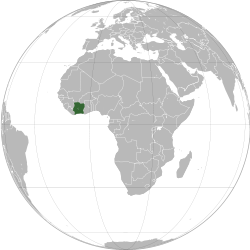Republic of Côte d'Ivoire République de Côte d'Ivoire (French) | |
|---|---|
 | |
 | |
| Capital | Yamoussoukro (political) Abidjan (economic) 6°51′N 5°18′W / 6.850°N 5.300°W |
| Largest city | Abidjan |
| Official languages | French |
| Population | |
• 2018 estimate | 23,740,424.[1] (54th) |
• Density | 63.9/km2 (165.5/sq mi) (139th) |
| GDP (PPP) | 2020 estimate |
• Total | $126.863 billion[2] |
• Per capita | $4,705[2] |
| ISO 3166 code | CI |
Crime in Cote d'Ivoire is prevalent and versatile across the West African country. The most common forms of crime include child labour, arms trafficking, terrorism and human rights abuse. Other less common, but still evident types of crime include cannabis and synthetic drug trade, sex trafficking, fauna and flora crimes, cybercrime.[3]
The European Union funded Enhancing Africa's Response to Transnational Organised Crime (ENACT) programme created a ten-point index score based on national criminality and resilience to crime.[3] Cote d'Ivoire has the fourth highest Criminality Score (6.23) in Africa and the second highest Criminality Score in West Africa, after Nigeria (7.70). Ivory Coast is part of the 37% of countries in Africa that have a high crime, but a low resilience to crime index score along with Egypt, Tanzania, Sudan and the Democratic Republic of Congo.[3]
Embedded actors throughout the state and political corruption prevents progress in reducing crime rates.[3] Many initiatives have been taken to reduce crime, especially in arms trafficking and child labour, by organisations such and the United Nations and UNICEF.[4][5]
- ^ "Côte d'Ivoire". The World Factbook. CIA Directorate of Intelligence. Retrieved 18 February 2017.
- ^ a b "Côte d'Ivoire". International Monetary Fund.
- ^ a b c d "Enhancing Africa's Response to Transnational Organised Crime / Organised Crime Index Africa 2019 [ebook]" (PDF). globalinitiative.net. European Union. 2019. Retrieved 2021-04-16.
- ^ Cite error: The named reference
:5was invoked but never defined (see the help page). - ^ "Child trafficking in Côte d'Ivoire: Efforts under way to reverse a tragic trend". UNICEF. Archived from the original on 2019-03-06. Retrieved 2020-02-08.

